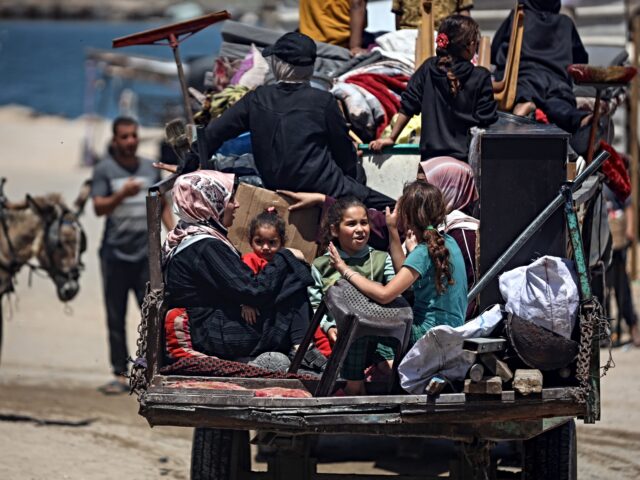U.N.: Over 122 Million People Forcibly Displaced by War and Persecution
 Majdi Fathi/NurPhoto via Getty
Majdi Fathi/NurPhoto via Getty
The U.N. High Commission on Refugees (UNHCR) on Thursday released its annual Global Trends Report, which found a record high of 123.2 million people were displaced from their homes around the world due to “persecution, conflict, violence, human rights violations, and events seriously disturbing the public order.”
UNHCR added a small hopeful note by saying that while the displaced population has “almost doubled globally over the last decade,” the rate of increase slowed in 2024, and the total number of refugees “has likely fallen slightly by 1 percent to 122.1 million” in the first half of 2025.
“We have seen some rays of hope over the last six months,” said U.N. High Commissioner for Refugees Filippo Grandi, pointing to the return of Syrian refugees as a sign that the worst displacement crisis of the past decade is abating.
UNHCR’s report predicted up to 1.5 million Syrian refugees abroad, plus 2 million internally displaced Syrians, could return to their homes by the end of this year. Overall, the report found refugee returns reaching the highest level in over two decades, although the vast majority of those returns were to just four countries: Afghanistan, Syria, South Sudan, and Ukraine.
“The past year also saw the highest number of refugees resettled to third countries for more than 40 years (188,800). In addition, almost 88,900 refugees obtained their host country’s citizenship or were granted permanent residence in 2024,” the report said.
On the other hand, forced displacement is rising in theaters like Myanmar, Sudan, the Democratic Republic of the Congo (DRC), and of course Ukraine and Gaza, the highest-profile conflicts in the world today. Sudan currently has more displaced persons than Syria.
UNHCR’s report said the outlook for 2025 will “depend on the dynamics in key situations” like those active conflicts, and whether more refugees feel safe in returning to countries like Afghanistan.
“While active fighting has largely ceased in Afghanistan following the Taliban takeover in 2021, poverty and hunger are widespread within the country, infrastructure and services remain inadequate, and civil liberties, especially for women and girls, have been progressively and severely restricted,” the report noted.
“The scale of returns has exacerbated Afghanistan’s ongoing humanitarian crisis, further straining scarce resources and hindering a dignified and sustainable reintegration of the returning refugees,” it said.
Not all of the world’s refugee crises are purely the result of human conflict or persecution, although those have been factors in making displacements caused by natural disasters even worse. The April earthquake in Myanmar was a dismal example, as the ruling junta continued attacks on civilian areas even before the aftershocks subsided, and conflict had already displaced over 3 million people before the quake destroyed even more homes.
Some of the world’s most pressing displacement crises involve internally displaced persons (IDPs), rather than migrants or international refugees. Haiti, for example, has a staggering number of people displaced internally by “gang violence and political instability.” The number of IDPs has tripled since 2023.
UNHCR also worried about the impact of funding cuts on “the capacity to address forced displacement situations around the world and create conducive conditions for a safe and dignified return.”
“Without sufficient funding, there will not be enough food assistance and basic shelter support for displaced people. Protection services, including safe spaces for refugee women and girls at risk of violence, are likely to be terminated,” the agency said.
“We are living in a time of intense volatility in international relations, with modern warfare creating a fragile, harrowing landscape marked by acute human suffering. We must redouble our efforts to search for peace and find long-lasting solutions for refugees and others forced to flee their homes,” said Grandi.
Source link

